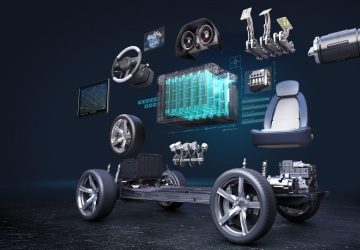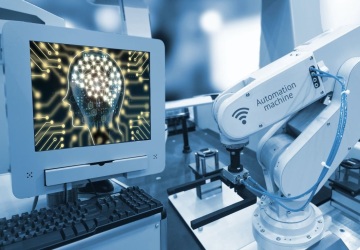The automotive landscape is undergoing an unprecedented transformation. Electric vehicles (EVs) are no longer a mere alternative to their gasoline counterparts; they stand at the forefront of automotive technology. As manufacturers pivot towards sustainable mobility solutions, they integrate innovations that promise an eco-friendly footprint and uncompromised high performance. Here, we dive into the top five innovations reshaping modern transportation's essence.
1. Solid-State Batteries: The Heart of Performance
The lifeblood of any electric vehicle is its battery, dictating its range and efficiency. Current lithium-ion batteries have been instrumental in propelling EVs into the mainstream, but there's always room for improvement. Enter solid-state batteries. These promise greater energy density, allowing cars. Moreover, they offer faster charging times and a considerably longer lifespan, reducing battery replacements. But the real game-changer? Their potential for high performance. With rapid energy discharge, EVs can achieve faster accelerations, making them eco-friendly and exhilarating.

2. Regenerative Braking Systems: Harnessing Lost Energy
One of the standout innovations in electric vehicles is the regenerative braking system. Traditional cars waste significant energy during braking in the form of heat. Regenerative braking flips this on its head. An electric vehicle's regenerative braking system involves the motor running backward as a generator whenever the brake pedal is depressed. As a result, this energy is returned to the battery. It's a two-fold advantage: extending the driving range and promoting eco-friendly energy conservation.
3. Lighter and More Efficient Structural Designs
Weight has always been a concern for EV manufacturers. The lighter the vehicle, the less the energy it requires to move. Modern electric cars are seeing innovations in using carbon-fiber composites and advanced alloys, enabling them to shed unnecessary weight without compromising structural integrity. These materials don't just make the vehicles lighter; they also enhance aerodynamics. The result? High-performance EVs that are agile, efficient, and robust.
4. AI-Powered Driver Assistance and Predictive Maintenance
Artificial Intelligence (AI) is embedding itself into every facet of our lives, and electric vehicles are no exception. Advanced AI algorithms are being incorporated to offer real-time driver assistance, making journeys safer and more efficient. Whether predicting traffic patterns, optimizing battery usage based on the route, or suggesting the best times to charge, AI ensures that EVs are always ahead. Additionally, AI assists in predictive maintenance, identifying potential issues with the vehicle before they become significant problems, thereby ensuring consistently high performance.

5. Wireless Charging: A Leap Towards a Seamless Experience
The idea of plugging in your vehicle might soon become archaic. Innovations in electric vehicle technology are gravitating toward wireless charging solutions. Using resonant inductive coupling, EVs can be charged by simply parking them over a charging pad. This eliminates the hassle of cords and promises faster charging speeds. Cities are also exploring the integration of these pads in public spaces, ensuring that your EV is charging while you shop or dine. The future might even see highways equipped with these pads, continuously charging your vehicle as you drive.
6. Augmented Reality Dashboards: Enhancing the Driving Experience
Today's electric vehicles are about more than efficient propulsion systems and revolutionizing the driving experience. The introduction of Augmented Reality (AR) dashboards is a monumental leap. These dashboards overlay digital information on the real world, directly presenting data like navigation routes, obstacle detection, and performance metrics on the windscreen. This integration ensures a seamless and safer driving experience as drivers no longer need to take their eyes off the road. The blend of innovation with high performance ensures drivers get the best of both worlds: cutting-edge technology and optimal functionality.
7. Solar Integration: The Power of the Sun on the Move
Harnessing the sun's energy, some EVs now have solar panels integrated into their rooftops or body. These panels absorb solar energy, converting it to power the car's battery, albeit to a limited extent. While they might not replace traditional charging methods, they signify the eco-friendly dedication of electric mobility, adding extra miles and reducing the dependency on grid power. It's an innovation that symbolizes the symbiotic relationship between nature and technology.
8. Bi-directional Charging: Turning EVs into Mobile Power Stations
Bi-directional charging is an exciting development in the EV sphere. Traditionally, vehicles would only draw power from the grid. However, bi-directional charging allows electric cars to supply power to the grid or a home. In a power outage scenario, your EV could power essential home appliances. This transformative innovation not only enhances the utility of EVs but also plays a pivotal role in grid management, especially when renewable energy sources are inconsistent.
9. Adaptive Cruise Control with Machine Learning
While adaptive cruise control is not new to the automotive world, the integration of machine learning takes it a notch higher in electric vehicles. This system doesn't just adapt to the car's speed in front; it learns its driver's driving patterns and preferences. Over time, it can make predictive adjustments that align with the driver's style, ensuring a tailored, ambitious experience that melds high performance with personalization.
10. Thermal Management Systems: Maximizing Battery Efficiency
Controlling the amount of heat generated by electric vehicles is an absolute necessity. Battery performance and longevity can both suffer when exposed to excessive heat. Regardless of the environmental circumstances, the battery will always run within the appropriate temperature range because of the sophisticated thermal management mechanisms. These technologies ensure consistently excellent performance and increase the battery's lifespan by either cooling or heating the battery according to the requirements. This highlights the union between long-term reliability and environmentally responsible driving.
Conclusion
Today's electric vehicles are not mere modes of transport but testaments to human ingenuity. As we witness the confluence of innovations, eco-friendly initiatives, and high performance, it's evident that the automotive world is on the brink of a transformative era. The roads of tomorrow will be dominated by these silent, efficient, and technologically advanced machines, reshaping our perception of mobility.
















